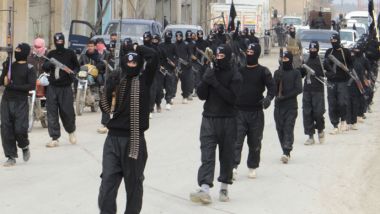ISIS cuts salary of its fighters by half as it suffers economic pressure from sustained military campaign

Newly leaked documents show that the terror group Islamic State (ISIS) has cut the salaries of all its fighters by half starting last year following sustained military pressure across Syria and Iraq.
Records of the ISIS Treasury Ministry reveal that ISIS leaders in Raqqa, the group's de-facto capital in Syria, reduced the monthly salaries of all its fighters by half sometime around November or December of last year, just as the U.S. began to dramatically increase its airstrikes against ISIS-held oil fields and other financial targets, the Jerusalem Post reported.
The extremists reportedly attributed the salary cut to "exceptional circumstances'' but did not elaborate further, the paper added.
Reports earlier said that ISIS has stored millions of cash money in a facility in Iraq's Mosul City, which was destroyed by the aerial bombing carried out recently by the U.S-led coalition.
"On account of exceptional circumstances the ISIS is facing, it has been decided to reduce the salaries that are paid to all mujahideen by half,'' said the official notice translated and first published by Aymeen Jawad al-Tamimi, an ISIS expert and fellow at the Middle East forum, according to vocativ.com.
"It is not allowed for anyone to be exempted from this decision, whatever his position,'' the group said, adding that fighters will continue to be paid twice a month, as usual.
According to the Post, the ISIS financial situation today is even worse than it was in December when the document came out.
While precise figures are not available, most ISIS fighters are believed to earn a few hundred dollars a month prior to the pay cut, said al-Tamimi. He added that military upkeep costs ISIS tens of millions of dollars a month and accounts for roughly two-thirds of the terror group's operating budget.
In order to deal with the financial damage, the ISIS-appointed governor of Mosul has reportedly issued a fatwa allowing militants to raise funds from the local citizens by taxing them. They claimed that the move would not affect the collection and distribution of Zakat, a religious obligatory tax, the paper said.
The group cited the Quran to justify its decision, claiming it prioritises "jihad of wealth,'' or spending in beneficial or charitable way, over "jihad of soul."
Experts, meanwhile, believe that the slash in fighters' pay signals the latest setback for the terror group and lends new support to U.S. claims that its strategy to disrupt ISIS' revenue stream is working.
ISIS has lost 40 percent of the territory it once held in Iraq, including the city of Ramadi and 20 percent of its territory in Syria, according to U.S. military.











